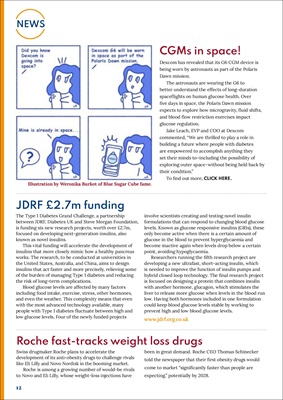
12
NEWS
CGMs in space!
Dexcom has revealed that its G6 CGM device is
being worn by astronauts as part of the Polaris
Dawn mission.
The astronauts are wearing the G6 to
better understand the effects of long-duration
spaceflights on human glucose health. Over
five days in space, the Polaris Dawn mission
expects to explore how microgravity, fluid shifts,
and blood flow restriction exercises impact
glucose regulation.
Jake Leach, EVP and COO at Dexcom
commented, "We are thrilled to play a role in
building a future where people with diabetes
are empowered to accomplish anything they
set their minds to-including the possibility of
exploring outer space-without being held back by
their condition."
To find out more, CLICK HERE.
JDRF £2.7m funding
The Type 1 Diabetes Grand Challenge, a partnership
between JDRF, Diabetes UK and Steve Morgan Foundation,
is funding six new research projects, worth over £2.7m,
focused on developing next-generation insulins, also
known as novel insulins.
This vital funding will accelerate the development of
insulins that more closely mimic how a healthy pancreas
works. The research, to be conducted at universities in
the United States, Australia, and China, aims to design
insulins that act faster and more precisely, relieving some
of the burden of managing Type 1 diabetes and reducing
the risk of long-term complications.
Blood glucose levels are affected by many factors
including food intake, exercise, stress, other hormones,
and even the weather. This complexity means that even
with the most advanced technology available, many
people with Type 1 diabetes fluctuate between high and
low glucose levels. Four of the newly funded projects
involve scientists creating and testing novel insulin
formulations that can respond to changing blood glucose
levels. Known as glucose responsive insulins (GRIs), these
only become active when there is a certain amount of
glucose in the blood to prevent hyperglycaemia and
become inactive again when levels drop below a certain
point, avoiding hypoglycaemia.
Researchers running the fifth research project are
developing a new ultrafast, short-acting insulin, which
is needed to improve the function of insulin pumps and
hybrid closed loop technology. The final research project
is focused on designing a protein that combines insulin
with another hormone, glucagon, which stimulates the
liver to release more glucose when levels in the blood run
low. Having both hormones included in one formulation
could keep blood glucose levels stable by working to
prevent high and low blood glucose levels.
www.jdrf.org.co.uk
Roche fast-tracks weight loss drugs
Swiss drugmaker Roche plans to accelerate the
development of its anti-obesity drugs to challenge rivals
like Eli Lilly and Novo Nordisk in the booming market.
Roche is among a growing number of would-be rivals
to Novo and Eli Lilly, whose weight-loss injections have
been in great demand. Roche CEO Thomas Schinecker
told the newspaper that their first obesity drugs would
come to market "significantly faster than people are
expecting," potentially by 2028.